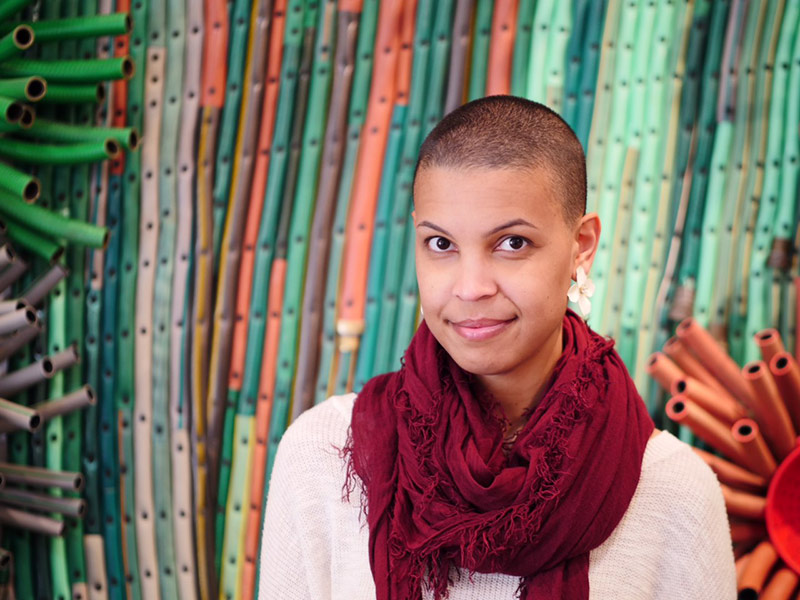Cities don’t spring into existence, but they can seem that way, as if they were neutral physical containers for the lives of inhabitants.
Cultural anthropologist Kathryn Mariner says that’s just the opposite of what built environments are. “Space is created, and space in turn creates the kinds of interactions that happen around and in it,” she says.
She’s researching placemaking in the city of Rochester. Her large-scale, multi-year project—titled “Fertile Ground” and supported with funding from the University of Rochester and the Woodrow Wilson National Fellowship Foundation—examines how people in marginalized communities are cultivating their lives in the midst of Rochester’s enduring history of racial segregation. The city’s divisions create profound differences in socioeconomic status, education, health, and opportunity for its citizens.
Design Justice: Power + Place
Bryan Lee, Jr.
September 19, 5:30
Hawkins-Carlson Room
Rush Rhees Library
Free and open to the public
This talk is part of the 2019–20 Humanities Center Public Lecture Series, this year exploring the theme of communities.
Bryan Lee, Jr. is an architect, educator, writer, and design justice advocate. He’s also the founder and design director of Colloqate Design, a nonprofit multidisciplinary design practice in New Orleans, Louisiana, dedicated to expanding community access to design and creating spaces of racial, social, and cultural equity. Lee was named one of the 2018 Fast Company Most Creative People in Business. In 2019, Colloqate became the youngest firm to win the Architectural League’s Emerging Voices award.
“I don’t think you can understand Rochester as a city without attending to space and the way that space has been inhabited, contested, reclaimed, and transformed,” Mariner says. She sees communities’ reinvention of place as a way to “envision and enact a more emancipatory future.”
A focus on “communities” at the Humanities Center
Mariner’s focus on community is shared this year by the Humanities Center, which has taken “communities” as its annual theme. “Communities and the forces that disrupt them are central to our sense of connection to others and thus to why we persist in striving to create a better world. The theme is a great example of the potential of humanistic inquiry to spur social change,” says Joan Shelley Rubin, the Ani and Mark Gabrellian Director of the Humanities Center and the Dexter Perkins Professor in History.
The center will raise the curtain on this year’s slate of public lectures with a September 19 talk by architect Bryan Lee, Jr. He’s a design justice advocate and the founder and design director of the multidisciplinary, New Orleans–based nonprofit Colloqate. Its mission is to organize, advocate, and design spaces of racial, social, and cultural equity. Buildings, Lee contends, can be a force for bringing greater justice to the world.
“The work Bryan is doing is so important because architecture in general is not a very diverse discipline,” and he brings a rare focus on social justice, says Mariner. Anthropologists and architects approach their work differently, “but I think we have a lot to learn from one another.”
Looking from the micro to the macro level
In the first phase of her fieldwork, Mariner is working at a micro level, exploring how city residents are reshaping outdoor environments in the city. They’re changing spaces, often with few resources, in ways that foster connection, as with community gardens and play spaces. As the project advances, Mariner will widen her focus.
“I don’t think you can understand these smaller grassroots spaces without branching out to the neighborhood and then the city,” she says. “So much of the history is about structural patterns that have impacted the city as a whole: zoning policies, environmental services, parks and recreation, public transportation, housing. All of these things are shaping space down to the micro level.”
An assistant professor of anthropology, Mariner published her first book in the spring. Contingent Kinship: The Flows and Futures of Adoption in the United States (University of California Press, 2019) examines transracial adoption and ideologies of family, race, and class. She earned her PhD from the University of Chicago in 2015 and carried out her ethnographic fieldwork for the book in that city.

Now a member of the steering committee for Rochester’s graduate program in visual and cultural studies, Mariner didn’t employ photos or films in the fieldwork for her book. The subject was sensitive, and she found herself attending to the erasures and invisibilities of the adoption process. But “Fertile Ground” is a highly visual project. Alongside the mapping, interviews, and observant participation in which Mariner is engaging, she’s also taking photos and providing cameras and prompts to community members, encouraging them to capture their environments in an anthropological technique called “photo voice.” An exhibition of the photographs will be held next year.
When teaching, Mariner asks students to consider the architecture of the classrooms they inhabit. What kinds of social interaction does the room encourage or discourage? Where does the layout situate authority? “One of the things I’m trying to do on my project is uncover the ways that things we think of as merely social are engineered into the spaces we inhabit,” she says. “What does it mean to design a building that fosters community—not just through what people are doing inside it, but through the structure itself?”



